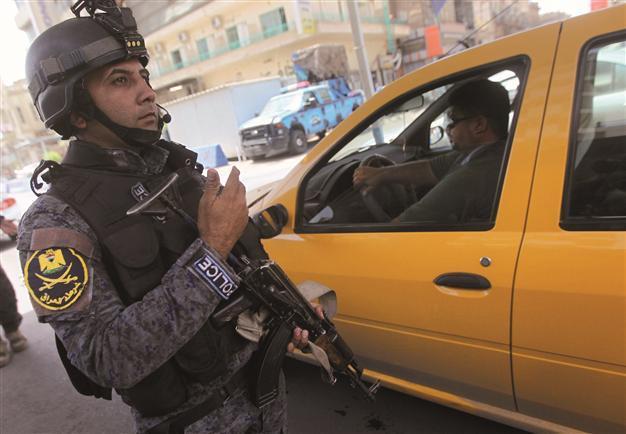Iraq commences hunt for fugitive extremists
BAGHDAD

An Iraqi police checks vehicles at a checkpoint in Baghdad, where security measures have been imposed after prisoners escaped from Abu Ghraib and Taji. AFP photo
An al-Qaeda front group July 23 claimed brazen assaults on Iraqi prisons that freed hundreds of militants including top leaders, killed over 40 people as Iraqi officials voiced fears that prison breaker militants may bring “darker days” to the country and the region.
The attacks on the prisons in notorious Abu Ghraib, west of Baghdad, and Taji, north of the capital, illustrate the growing reach of militants in Iraq and the deteriorating security situation in the country, where more than 600 people have been killed in violence so far this month.
“The mujahideen [holy warriors], after months of preparation and planning, targeted two of the largest prisons of the Safavid government,” said a statement signed by the Islamic State of Iraq and the Levant, using a pejorative term for Shiites.
The statement claimed that “hundreds” of inmates, among them 500 militants, were freed in the attacks. It also said that the operation was the final one in a campaign aimed at freeing prisoners and targeting justice system officials, which was called for in an audio statement attributed to the group’s leader, Abu Bakr al-Baghdadi, last year.
The statement, posted on a jihadist forum, came as security forces were hunting intensely for the escapees, said by MPs to number at least 500 before they are able to rejoin the ranks of the militants.
“Dark days are waiting for Iraq. Some of those who escaped are senior leaders of al-Qaeda, and the operation was executed for this group of leaders,” a high-ranking security official said on condition of anonymity. “Those who escaped will work on committing acts of revenge, most of which might be suicide attacks,” the official added.
MP Hakem al-Zamili, a member of Parliament’s security and defense committee, confirmed that senior al-Qaeda members had escaped, and expressed fear that they would return to haunt Iraq again. “Most of the inmates who escaped from Abu Ghraib prison were senior members in the al-Qaeda organization and [had been] sentenced to death,” Zamili said. “These terrorists will go to Syria to return to the [al-Qaeda] organization and return again to Iraq to carry out terrorist attacks against the Iraqi people,” he said.
Al-Qaeda-linked fighters are among those battling the regime of President Bashar al-Assad in Syria, which shares a long border with Iraq.
Abu Ghraib became notorious after photographs showing Iraqi detainees being humiliated and abused by their U.S. guards were published in 2004. It also served as a torture centre under executed dictator Saddam Hussein’s ousted regime.
In what appears to have been a carefully-planned operation, militants waiting outside the prisons launched their attacks after inmates inside began rioting. “The first information we have indicates that the incident started from inside the prison,” the security official said.
“There were riots and then the prisoners took control of some guns and called the groups that were waiting outside.” Militants then attacked with mortar rounds, bombs and gunfire, sparking clashes with security forces that raged for 10 hours. At least 20 security forces members and 21 inmates died in the unrest.
Officials have declared “a curfew around the two prisons, where ongoing search operations are being conducted,” justice ministry spokesman Wissam al-Fraiji said. Fraiji said that 108 escaped prisoners had been recaptured, and reinforcements from the interior and justice ministries have been sent to the two prisons.
